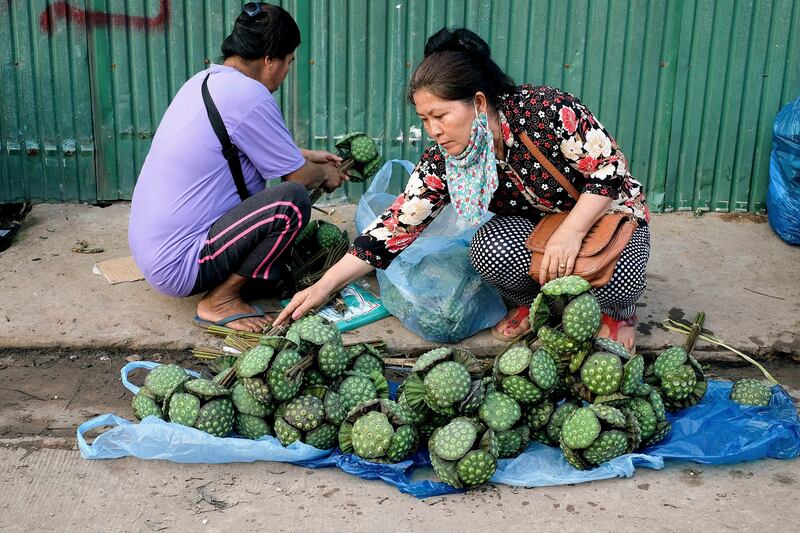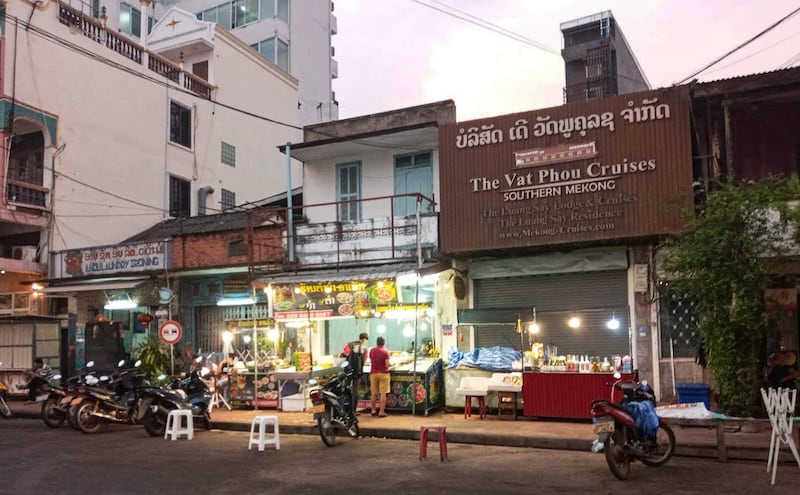A government plan to close two thriving markets in Vientiane for renovation ahead of the Lao capital’s hosting of the ASEAN Summit next year has angered vendors who say they’ll have nowhere to sell their goods and fear a spike in rent when they reopen.
Other stall owners told Radio Free Asia that the teardowns will destroy the historic significance of the Khua Dine and Sihom Night markets and damage their tourism appeal, as the two sites are fixtures on the itineraries of visitors from abroad.
Developers announced that the sites would close around April 25 to be made cleaner and more convenient for both vendors and visitors. Construction is likely to take 10-12 months, vendors said.
Authorities said the Sihom Night Market, which has about 300 stalls and is also known as Hengboun Food and Culture Street, was “crowded and unorganized,” and that vendors obstructed traffic and created large amounts of garbage. Also, it lacked toilets for visitors.
“We must tidy up the city to help facilitate the same,” Nantha Sanuvong, deputy director of the Department of Industry and Commerce Vientiane Capital, said at a press conference. He said the renovation was related to the 2024 ASEAN Summit and other “important conferences starting in April.”
To spruce up the city before the summit, officials are also planning to bury unsightly telephone lines and crack down on noise pollution.
What to do in the meantime?
One merchant at Sihom said the government acted too hastily to shut it down, giving them only a day or two’s notice.
“At least the government should have found a new place for us before the closure,” said the merchant, who declined to be named for his own safety. “Now we have nowhere to sell.”
“The Sihom Night Market is popular among tourists,” he added. “If officials make us set up shop somewhere else, we’re afraid that not as many tourists will come to buy as they do here.”

At the Khua Dine Market, some of the roughly 100 owners welcomed the renovation plans. But many others said the closure will destroy their livelihoods and expressed frustration that no accommodations were made for their businesses.
“Merchants will have to wait at least 10 months to a year for the work to finish,” said one stall owner, speaking to RFA on condition of anonymity.
During that time, “merchants won’t have another location to sell their products” and will be forced to find a space at other markets, which would require a large up-front deposit that few have access to.
And although merchants who leave their deposit with Khua Dine’s developer, Lieng Heng Enterprise Commercial Management, will have priority to set up their stalls again when the renovation is complete, those who cash their deposit out will have no guarantee that they can return, the stall owner said.
Another merchant told Radio Free Asia that he is worried Khua Dine’s developer will raise the rent for stalls once the market reopens.
“This market is a popular landmark – everybody knows it very well,” he said. “After renovation, it will be clean and modern, but we’re afraid that they will increase the rent to a level that we can’t afford.”
Losing charm
The renovation of Khua Dine might make the market too sterile, others worried, saying the chaotic early morning bustle at the market is part of its charm. They urged developers to refrain from razing the older structures, which they said are part of the 50-year-old market’s historical significance.

“The Lao people have important memories of [the market], as it is a place where families have bought groceries over many generations,” said a resident of the area near Khua Dine on Nongboun Road, close to the Vientiane Center shopping mall.
“Also, most of the merchandise at the market is wholesale,” he added, meaning that shoppers will find it difficult to find affordably priced items elsewhere.
Others bemoaned the loss of revenue from tourists, who visit the market in droves to buy souvenirs and locally-produced goods.
Police will be patrolling the area around Hengboun Road to ensure that all stalls have been dismantled. If any vendors remain open, they will be given a written warning, and those who continue to operate after that will be given a fine and have their goods confiscated.
Translated by Sidney Khotpanya. Edited by Josh Lipes and Malcolm Foster.
